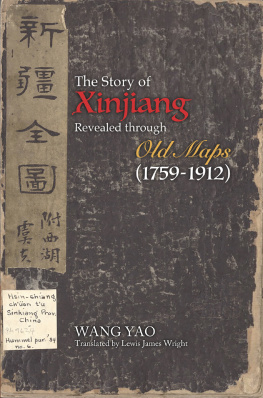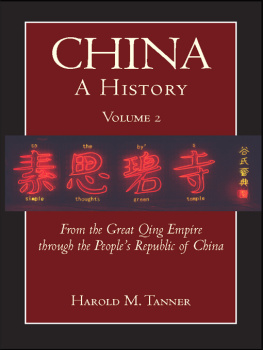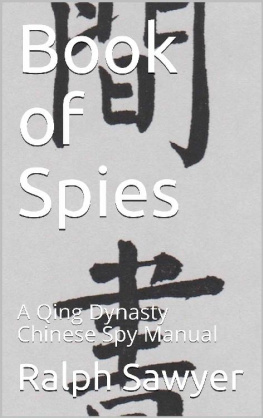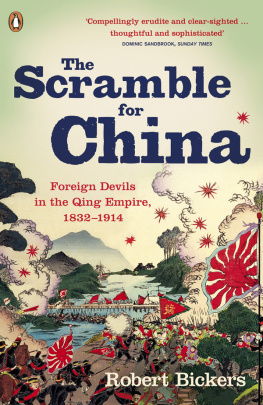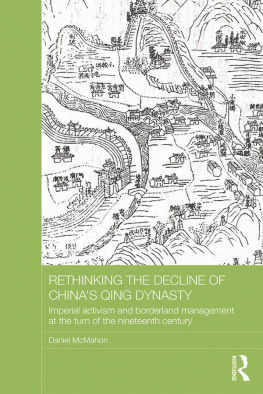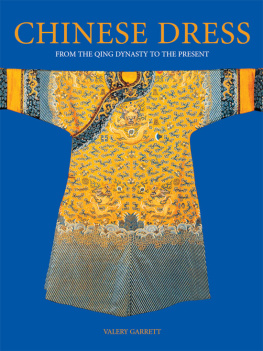Qing Governors and Their Provinces
Qing Governors and Their Provinces
The Evolution of Territorial Administration in China, 16441796
R. KENT GUY
A China Program Book

This book was supported in part by the China Studies Program, a division of the Henry M. Jackson School of International Studies at the University of Washington, and by the Donald R. Ellegood International Publications Endowment.
2010, 2013 by the University of Washington Press
Printed in United States of America
18 17 16 15 14 13 5 4 3 2 1
All rights reserved. First edition 2010. Revised edition 2013. No part of this publication may be reproduced or transmitted in any form or by any means, electronic or mechanical, including photocopy, recording, or any information storage or retrieval system, without permission in writing from the publisher.
University of Washington Press
PO Box 50096, Seattle, WA 98145, USA
www.washington.edu/uwpress
Library of Congress Cataloging-in-Publication Data
Guy, R. Kent, 1948
Qing governors and their provinces : the evolution of territorial administration in China, 16441796 / R. Kent Guy.
p. cm. (A China Program book)
ISBN 978029599295-2 (pbk. : alk. paper)
1. ChinaHistoryQing dynasty, 16441912.
2. ChinaPolitics and government16441912.
3. GovernorsChinaHistory17th century.
4. GovernorsChinaHistory18th century.
5. Chinese provincesHistory17th century.
6. Chinese provincesHistory17th century.
7. ChinaTerritories and possessionsPolitics and government17th century.
8. ChinaTerritories and possessionsPolitics and government18th century.
I. Title. DS754.25.G89 2010 951.032dc22 2010001806
The paper used in this publication is acid-free and recycled from at least 30 percent post-consumer waste. It meets the minimum requirements of American National Standard for Information SciencesPermanence of Paper for Printed Library Materials, ANSI Z39.481984. 
To the memories of
Robert S.
and
Ernestine Guy
Contents
Tables
Acknowledgments
The first acknowledgment to be made here is recognition of the almost inconceivable patience with which friends, family, and colleagues have awaited this manuscript. The project began with a research trip in 1984 to the First Historical Archives in Beijing, funded by the Committee on Scholarly Communications with the Peoples Republic of China. The purpose of the trip was to examine the transition between the Yongzheng and Qianlong reigns in the Qing, in order to determine the most important political and administrative changes that took place during the late 1730s. What changed the most, it developed, were provincial governors: No less than eight provincial governors, leaders of half of Chinas provinces, were changed in the year 1736. As I contemplated this fact, I realized that I had absolutely no context for evaluating it. How unusual was it for eight governors to be appointed in one year? Were governors changed more frequently in some provinces than in others? Could appointment practice be read as a record of the central governments engagement with regional affairs? These questions led me to assemble a database of governors appointments during the high Qing period (see appendix). A summer stipend from the National Endowment for the Humanities in 1988 permitted preliminary analysis of the data, as did a subsequent sabbatical leave from the University of Washington. Further leaves from the university have allowed me to explore the rules governing appointments of governors, and civil officials more generally, in the Qing; the nature of governors biographies; and the different appointment patterns in different regions. This project has taken me away from the original archival work I did in Beijing in 1984, but it has served, I hope, to provide some context for the work Qing historians will be doing in archives for years to come.
No book is the product of a single individual, and this one owes much to colleagues and friends. Like many books produced in the University of Washington History Department, this one has benefited significantly from the generosity of Howard and Frances Keller. The Department of History and the Jackson School of International Studies and its China Studies Program have all supported this effort, as have the successive chairs of these groups: Jere Bacharach, David Bachman, John Findlay, Richard Johnson, Robert Stacey, and Anand Yang, with Richard Johnson, in particular, offering very valuable comments on the manuscript. Patricia Ebrey has been a wonderfully stimulating and supportive colleague, as were the late Jack Dull and James Palais. Farther afield, Dai Yi, Guo Chengkang, Tom Gottschang, Philip Kuhn, Susan Naquin, Willard Peterson, Edward Rhoads, William Rowe, Ma Ruheng, Jonathan Spence, Karen Turner, Tsing Yuan, and a particularly vigorous anonymous reader for the Press have all provided help and encouragement as this project developed. I am grateful to several generations of University of Washington graduate students who have read the manuscript and to Andrew Eisenberg, Patrick Walsh, Li Yi, Dai Yingcong, Yi Sumei, Christopher Agnew, Bradley Davis, and Cheng Hsiaowen, who have assisted me in various stages of the work. Lorri Hagman of the University of Washington Press has been the soul of patience and competence throughout the process. My father Robert S. Guy has lent me his fascination with personnel processes and the results of his many years of practice and teaching in this area. My immediate family, Chris Cordell and Alexis Guy, have been patient through my years of an obsessive quest to make a computer do my bidding and have added joy and balance to the years. I can never thank them enough.
Over the years, I have been able to repay only a tiny fraction of the debts incurred on this project. I am grateful for opportunities to present my research at Princeton University, the University of Southern California, the University of British Columbia, Holy Cross College, Renmin Daxue, Sungkyunkwan University, and the University of Oslo as well as at the Association for Asian Studies and its West Coast branch. This book is offered in partial payment for the many kindnesses I have enjoyed over the years, but it can be only partial recompense.
Although no book is the work of a single individual, mistakes are. For those that remain here, I take humble and chagrined responsibility.
R. KENT GUY
Seattle, Washington
Qing Governors and Their Provinces
Introduction
As the historians eye searches for the stuff of grand strategy, the dynamics of policy formation, or evidence of the unseen movement of social change, it usually passes over the routine records of personnel transition and official careers that mark the daily life of any empire. Yet buried in this documentary detritus are stories as rich as any found in more conventional sources, and often more compelling for being cast in the form of human narratives. This is particularly the case in the history of late imperial China. Given the ideology upon which his rule rested, the nature of Qing law, and the routines of the court, no Chinese emperor could afford to neglect recruiting and evaluating human talent, even if he might slight other aspects of administration. In particular, no Qing emperor could or did ignore the task of appointing governors to each of the provinces of the Qing empire, for governors were the imperial courts eyes and ears in a sea of local and regional interests.
Next page

